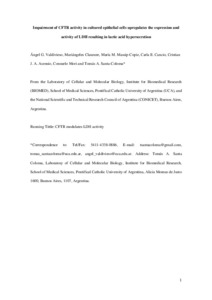Please use this identifier to cite or link to this item:
https://repositorio.uca.edu.ar/handle/123456789/9596| Título: | Impairment of CFTR activity in cultured epithelial cells upregulates the expression and activity of LDH resulting in lactic acid hypersecretion | Autor: | Valdivieso, Ángel Gabriel Clauzure, Mariángeles Massip Copiz, María Macarena Cancio, Carla E. Asensio, Cristian J. A. Mori, Consuelo Santa Coloma, Tomás Antonio |
Palabras clave: | CFTR; FIBROSIS QUISTICA; INFLAMACION; CELULAS EPITELIALES; INTESTINOS; ACIDO LACTICO | Fecha de publicación: | 2019 | Editorial: | Springer | Cita: | Valdivieso, A.G. et al. Impairment of CFTR activity in cultured epithelial cells upregulates the expression and activity of LDH resulting in lactic acid hypersecretion [en línea]. Cellular and Molecular Life Sciences. 2019, 76. doi:10.1007/s00018-018-3001-y Disponible en: https://repositorio.uca.edu.ar/handle/123456789/9596 | Resumen: | Asbtract: Mutations in the gene encoding the CFTR chloride channel produce cystic fibrosis (CF). CF patients are more susceptible to bacterial infections in lungs. The most accepted hypothesis sustains that a reduction in the airway surface liquid (ASL) volume favor infections. Alternatively, it was postulated that a reduced HCO3- transport through CFTR leads to a decreased ASL pH, favoring bacterial colonization. The issue is controversial, since recent data from cultured primary cells and CF children showed normal pH values in the ASL. We have reported previously a decreased mitochondrial Complex I (mCx-I) activity in cultured cells with impaired CFTR activity. Thus, we hypothesized that the reduced mCx-I activity could lead to increased lactic acid production (Warburg-like effect) and reduced extracellular pH (pHe). In agreement with this idea, we report here that cells with impaired CFTR function (intestinal Caco-2/pRS26, transfected with an shRNA-CFTR, and lung IB3-1 CF cells) have a decreased pHe. These cells showed increased lactate dehydrogenase (LDH) activity, LDH-A expression, and lactate secretion. Similar effects were reproduced in control cells stimulated with recombinant IL-1β. The c-Src and JNK inhibitors PP2 and SP600125 were able to increase the pHe, although the differences between control and CFTR-impaired cells were not fully compensated. Noteworthy, the LDH inhibitor oxamate completely restored the pHe of the intestinal Caco-2/pRS26 cells and have a significant effect in lung IB3-1 cells; therefore, an increased lactic acid secretion seems to be the key factor that determine a reduced pHe in these epithelial cells. | URI: | https://repositorio.uca.edu.ar/handle/123456789/9596 | ISSN: | 1420-9071 (online) 1420-682X (impreso) |
Disciplina: | MEDICINA | DOI: | 10.1007/s00018-018-3001-y | Derechos: | Acceso abierto | Fuente: | Cellular and Molecular Life Sciences. 2019, 76 |
| Appears in Collections: | Artículos |
Files in This Item:
| File | Description | Size | Format | |
|---|---|---|---|---|
| impairment-cftr-activity-cultured.pdf | 1,5 MB | Adobe PDF |  View/Open |
Page view(s)
170
checked on Apr 27, 2024
Download(s)
340
checked on Apr 27, 2024
Google ScholarTM
Check
Altmetric
Altmetric
This item is licensed under a Creative Commons License

